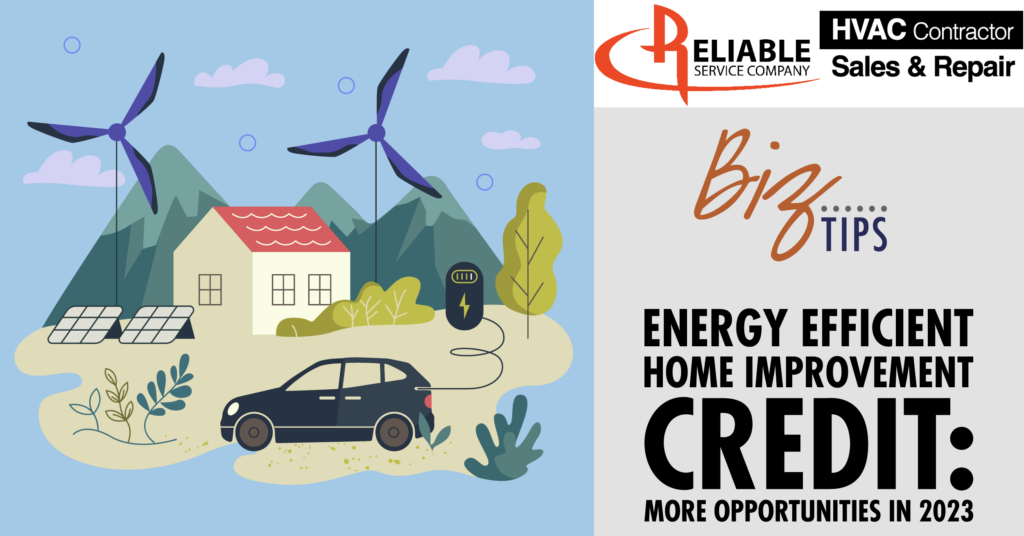Maximizing Your ROI: A Guide to 2023 Energy Tax Credits for Home Improvement Projects
2023 Energy Tax Credits are significant. Upgrading homes has gained momentum among Americans, resulting in a significant surge in the home improvement industry over the past decade. What used to be a $300 billion industry is now valued at over $624 billion.
Considering the substantial investments homeowners make in their home improvements, it’s essential to identify which projects can offer a return on investment during the upcoming 2023 tax season. Homeowners can benefit from energy tax credits in 2023, which cover various areas of their homes. This article will explore the tax credits associated with heating and cooling equipment.
2023 Energy Tax Credits: Increase Your Savings with Energy-Efficient Home Upgrades
Did you know upgrading your home with energy-efficient appliances can earn you tax credits? The Inflation Reduction Act has recently extended and expanded the available tax credits for taxpayers, making it even more beneficial to invest in energy-efficient upgrades.
Energy tax credits are incentives the government offers to encourage taxpayers to make energy-efficient improvements to their homes or properties. These upgrades include installing solar panels, heat pumps, windows, or insulation. Although taxpayers won’t receive an immediate discount on their purchases, they may qualify for a tax credit.
For instance, if you purchase an energy-efficient HVAC system worth $15,000 and are eligible for the 30% tax credit, you can receive a maximum credit of $600 toward your taxes.
Understanding 2023 Tax Credits for Energy Star Heat Pump Upgrades and Saving Energy
You might be eligible for an energy tax credit if you purchased and installed an Energy Star-certified heat pump on your primary residence before December 31, 2022. The credit is equivalent to 10% of the total cost (up to $500) or a specific amount ranging from $50 to $300, depending on the system.
To qualify for the tax credit, the heat pump must meet the energy-efficiency requirements for split and packaged systems. The credit only applies if the heat pump began servicing an existing home used as the primary residence and not for new construction or rentals.
For heat pumps purchased and installed between January 1, 2023, and December 31, 2032, you may receive a tax credit equivalent to 30% of the total project cost, up to $2,000, provided that the equipment meets the required standards.
Tax Credits for Energy-Efficient Central Air Conditioning Systems
If you install a central air conditioning unit in your home before the end of 2022, you may be eligible for the Non-Business Energy Property Tax Credits. The tax credit amount for qualifying units is $300. To ensure eligibility, ask your HVAC contractor to provide the Manufacturer’s Certification Statement for the equipment purchased.
For central air conditioners installed in your primary residence between January 1, 2023, and December 31, 2032, you can claim a tax credit of 30% of the total project cost, with a maximum benefit of $600. Note that new construction homes and rentals are not eligible for this tax credit.
To qualify, the central air conditioning system must meet Energy Star’s eligibility criteria, which include split systems with a SEER2 > 16 and Energy Star certification. All Energy Star-certified packaged systems are also eligible.
Tax Credits for Gas Energy Star Certified Furnace Upgrades
Energy Star certified gas furnaces installed in your primary residence on or before December 31, 2022, may qualify for a tax credit of $150. Note that furnaces for new-construction homes, rental properties, or located in the U.S. South do not qualify.
You may claim an energy tax credit if you install oil or gas furnaces between January 1, 2023, and December 31, 2032. You can receive up to 30% of the total project cost for qualifying units, with a maximum credit of $600.
2023 Energy Tax Credit Limits: Understanding the Maximum Benefits and Eligibility Requirements
The maximum tax credit for energy-efficient home upgrades in one year is $3,200. This limit includes a maximum credit of $1,200 for upgrades such as windows, doors, skylights, insulation, electrical improvements, furnaces, boilers, and central air conditioners.
The remaining $2,000 credit can be obtained by upgrading any combination of heat pumps, heat pump water heaters, and biomass stoves/boilers. It is important to note that tax credits for geothermal heat pumps do not count towards the $3,200 limit. Energy Star defines the eligible tax credits for geothermal heat pumps.
For more information about Energy Tax Credits
